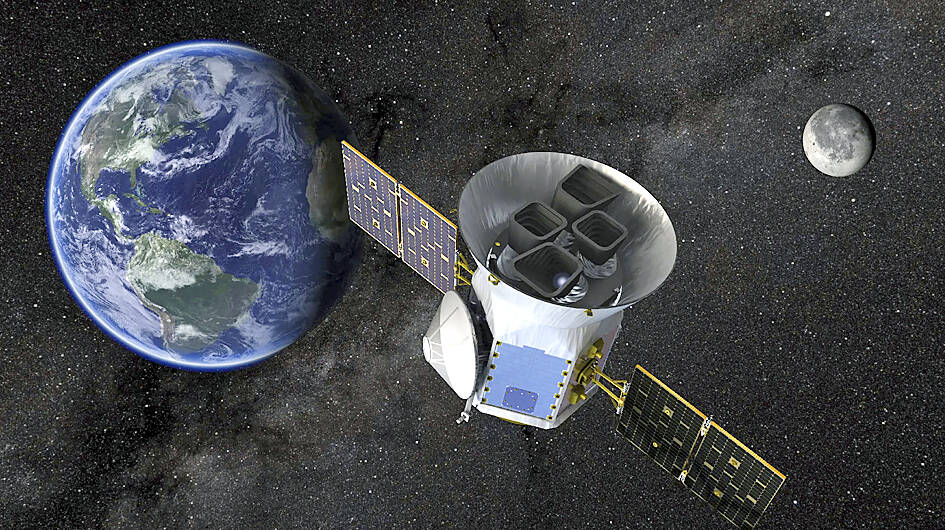Astronomers on Wednesday announced they have discovered a massive planet orbiting a tiny star, a bizarre pairing that has stumped scientists.
Most of the stars across the Milky Way are small red dwarfs such as TOI-6894, which has only 20 percent the mass of our sun.
It had not been thought possible that such puny, weak stars could provide the conditions needed to form and host huge planets, but an international team of astronomers have detected the unmistakable signature of a gas giant planet orbiting the undersized TOI-6894, according to a study in the journal Nature Astronomy.

Photo: NASA via AP
That makes the star the smallest star yet known to host a gas giant. The planet has a slightly larger radius than Saturn, but only half its mass. It orbits its star in a little more than three days.
The astronomers discovered the planet when searching through more than 91,000 low-mass red dwarfs observed by NASA’s Transiting Exoplanet Survey Satellite telescope.
Its existence was confirmed by ground-based telescopes, including Chile’s Very Large Telescope.
“The fact that this star hosts a giant planet has big implications for the total number of giant planets we estimate exist in our galaxy,” study coauthor Daniel Bayliss of England’s University of Warwick said in a statement.
Another coauthor, Vincent Van Eylen, of University College London, said it was an “intriguing discovery.”
“We don’t really understand how a star with so little mass can form such a massive planet,” he said. “This is one of the goals of the search for more exoplanets. By finding planetary systems different from our solar system, we can test our models and better understand how our own solar system formed.”
The most prominent theory for how planets form is called core accretion.
The process begins when a ring of gas and dust — called a protoplanetary disc — which surrounds a newly formed star builds up into a planetary core. That core attracts more gas that forms an atmosphere, eventually snowballing into a gas giant.
Under that theory, it is difficult for low-mass stars to host giant planets, because there is not enough gas and dust to begin building a core in the first place.
A rival theory proposes that such planets instead form when their protoplanetary disc becomes gravitationally unstable and breaks up, with the collapsing gas and dust forming a planet.
Neither theory seems to explain the existence of the newly discovered planet, TOI-6894b, the researchers said.
The planet also interests scientists because it is strangely cold.
Most of the gas giants discovered outside our solar system so far have been what are known as “hot Jupiters,” where temperatures soar well over 1,000°C.
The newly discovered planet appears to be less than 150°C, the researchers said.
“Temperatures are low enough that atmospheric observations could even show us ammonia, which would be the first time it is found in an exoplanet atmosphere,” study coauthor Amaury Triaud of England’s University of Birmingham said.

Nauru has started selling passports to fund climate action, but is so far struggling to attract new citizens to the low-lying, largely barren island in the Pacific Ocean. Nauru, one of the world’s smallest nations, has a novel plan to fund its fight against climate change by selling so-called “Golden Passports.” Selling for US$105,000 each, Nauru plans to drum up more than US$5 million in the first year of the “climate resilience citizenship” program. Almost six months after the scheme opened in February, Nauru has so far approved just six applications — covering two families and four individuals. Despite the slow start —

YELLOW SHIRTS: Many protesters were associated with pro-royalist groups that had previously supported the ouster of Paetongtarn’s father, Thaksin, in 2006 Protesters rallied on Saturday in the Thai capital to demand the resignation of court-suspended Thai Prime Minister Paetongtarn Shinawatra and in support of the armed forces following a violent border dispute with Cambodia that killed more than three dozen people and displaced more than 260,000. Gathered at Bangkok’s Victory Monument despite soaring temperatures, many sang patriotic songs and listened to speeches denouncing Paetongtarn and her father, former Thai prime minister Thaksin Shinawatra, and voiced their backing of the country’s army, which has always retained substantial power in the Southeast Asian country. Police said there were about 2,000 protesters by mid-afternoon, although

MOGAMI-CLASS FRIGATES: The deal is a ‘big step toward elevating national security cooperation with Australia, which is our special strategic partner,’ a Japanese official said Australia is to upgrade its navy with 11 Mogami-class frigates built by Japan’s Mitsubishi Heavy Industries, Australian Minister for Defence Richard Marles said yesterday. Billed as Japan’s biggest defense export deal since World War II, Australia is to pay US$6 billion over the next 10 years to acquire the fleet of stealth frigates. Australia is in the midst of a major military restructure, bolstering its navy with long-range firepower in an effort to deter China. It is striving to expand its fleet of major warships from 11 to 26 over the next decade. “This is clearly the biggest defense-industry agreement that has ever

DEADLY TASTE TEST: Erin Patterson tried to kill her estranged husband three times, police said in one of the major claims not heard during her initial trial Australia’s recently convicted mushroom murderer also tried to poison her husband with bolognese pasta and chicken korma curry, according to testimony aired yesterday after a suppression order lapsed. Home cook Erin Patterson was found guilty last month of murdering her husband’s parents and elderly aunt in 2023, lacing their beef Wellington lunch with lethal death cap mushrooms. A series of potentially damning allegations about Patterson’s behavior in the lead-up to the meal were withheld from the jury to give the mother-of-two a fair trial. Supreme Court Justice Christopher Beale yesterday rejected an application to keep these allegations secret. Patterson tried to kill her